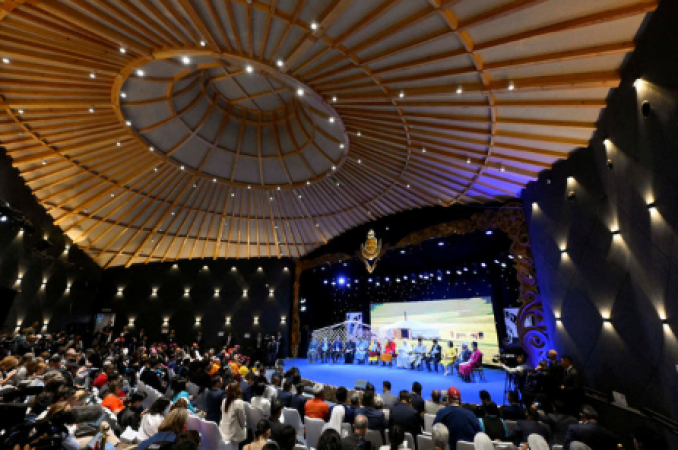
Ulaanbaatar: In a poignant moment of interfaith solidarity, Pope Francis drew inspiration from Buddha as he urged religious leaders to engage in dialogue as a powerful weapon against the scourge of fundamentalism.
Speaking during an interfaith meeting at the Vatican, the Pope invoked wisdom encapsulated in a passage from the Dhammapada, a revered collection of sayings attributed to Buddha: "Hatred is never overcome by hatred. Hatred is overcome by love. This is the eternal law."
The Pope's message was clear and resonant: In an era marred by religious tensions and the specter of fundamentalism, understanding and love must prevail through dialogue. Religious leaders, he argued, bear a profound responsibility to counteract the divisive tendrils of fundamentalism by championing dialogue and fostering a culture of mutual understanding.
Also Read: Tharman Shanmugaratnam Landslide Victory: Singapore's New President Signals Stability and Diversity
"The more we know each other, the more we can understand each other," declared Pope Francis, encapsulating the essence of his appeal for religious leaders to bridge divides through dialogue. He continued, "The more we understand each other, the more we can love each other."
These words underscore a fundamental truth—that knowledge and empathy are potent antidotes to ignorance and prejudice. In the context of religious diversity, fostering understanding among different faiths can serve as a beacon of hope in a world grappling with religious strife.
The Pope delved deeper into the genesis of fundamentalism, highlighting its roots in fear, specifically, the fear of the other, the stranger, and the unknown. It is a fear born from ignorance, a fear that festers in the absence of dialogue and understanding. In this context, he painted a stark contrast: Fundamentalism is the child of fear, while dialogue is the offspring of understanding.
To confront and dissipate this fear, Pope Francis advocated a simple yet profound metaphor: "We need to build bridges, not walls." In an era where divisive rhetoric and isolationist policies often take center stage, the Pope's call for unity through connectivity resounds as a powerful symbol of hope.
He elaborated on this notion: "We need to build bridges between cultures, between religions, between peoples. We need to build bridges of dialogue, of understanding, of love." This vision encapsulates the transformative potential of dialogue to mend the schisms that have torn communities and nations apart.
Also Read: Anti-Migrant March in Cyprus Turns Violent: Challenges Amidst a Growing Immigration Crisis
Pope Francis's plea for interfaith dialogue arrives amidst a backdrop of escalating religious tensions on the global stage. In recent years, the world has borne witness to a series of terrorist attacks perpetrated by religious extremists, incidents that underscore the pressing need for unity and understanding among diverse religious communities.
The Pope's exhortation serves as a profound reminder that religion, when harnessed as a force for good, possesses the transformative power to heal wounds and foster cooperation. When individuals of diverse faiths come together to converse and learn from one another, they lay the foundation for bridges of understanding and cooperation to be constructed.
The Pope's commitment to promoting interfaith dialogue is not a newfound initiative but rather a consistent theme throughout his papacy. In 2016, he hosted a historic gathering of world religious leaders at the Vatican, an event that underscored the importance of unity among faiths.
Additionally, Pope Francis has made notable visits to various places of worship, including mosques, as a tangible expression of his commitment to fostering interfaith harmony.
While Pope Francis's efforts to promote interfaith dialogue have garnered praise from many religious leaders and advocates of peace, they have not been without criticism. Some have argued that he should take a more unequivocal stance against religious extremism.
The Pope has consistently maintained that he is dedicated to combating religious extremism. However, he also underscores the significance of understanding the root causes of extremism, which often include factors such as poverty, inequality, and lack of opportunity.
Also Read: Escalating Measures Confront Channel Migrants as Authorities Seek to Curb Dangerous Crossings
Pope Francis's impassioned call for interfaith dialogue carries immense significance in a world grappling with religious discord and extremism. It reaffirms that understanding, empathy, and love are the essential tools to counter the seeds of hatred and division.
His message serves as an enduring reminder that people of diverse faiths can, through dialogue and cooperation, forge a path toward a brighter and more harmonious future. In an era marked by uncertainties and conflicts, Pope Francis's words resonate as a beacon of hope, urging the world to embrace dialogue, build bridges, and, above all, choose love over hatred.